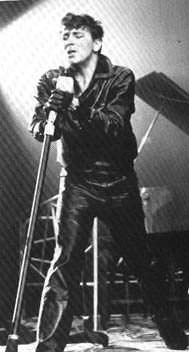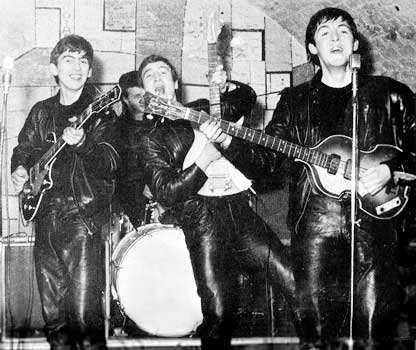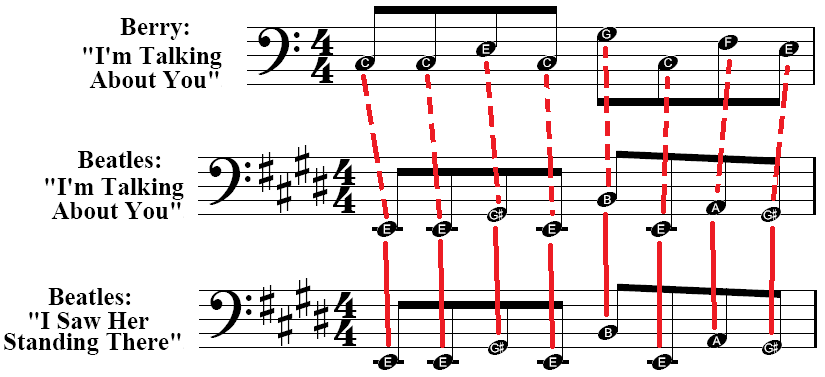|
And after watching "Meet the Beat Alls", YouTube recommended this: And what's really great is how musically accurate it all is - the parodies are the real songs inverted, and even the added sixth chord at the end!
0 Comments
My thanks to Mr. Daniel Kasnitz for alerting me to one of the best Beatles parodies I've ever seen (sorry, Rutles) after this evening's "The Beatles: Band of the Sixties" at the Brooks Memorial Library! In preparation for a documentary film about Carl Perkins, Paul McCartney claimed, "If there were no Carl Perkins, there would be no Beatles." And while Macca might be exaggerating, his influence on the young Beatles is undeniable. Throughout the Quarrymen/Beatles' existence, they played a total of at least 11 Carl Perkins songs in live show repertoire (as dictated in Lewisohn, page 362-65), listed here in approximate chronological order.
The Beatles officially recorded and released "Honey Don't", "Everybody's Trying to be my Baby", and "Matchbox", all in 1964. Although sung by Ringo on the official recording, "Matchbox" was for a time sung by George Harrison, as the recording off the album Live! At the Star-Club proves. Pete Best actually sang the song from 1960 until his departure from the band in mid-1962, with George and John apparently trading off turns singing lead in his absence in late 1962. "Lend Me Your Comb" is particularly interesting because the Beatles borrowed a distinctive chord progression from it for use in "Please Please Me". Both songs are in E major and use the chords G-A-B (underlined below): “Lend Me Your Comb” B E G A B E I gotta confess my hair is a mess. E: V I bIII IV V I “Please Please Me” E A E G A B E Last night I said these words to my girl E: I IV I bIII IV V I Furthermore, the Beatles were clearly conscious of the 'borrowing' because "Lend Me Your Comb" had been in their repertoire since 1957. Two different recordings exist of the Beatles covering "Lend Me Your Comb" on three different albums: Anthology 1 and On Air - Live at the BBC, Volume 2 both include a live recording from 2 July 1963... ... and Live! At the Star-Club features a recording from December 1962. Just as the Beatles borrowed chords from "Lend Me Your Comb", so too they borrowed the distinctive chords of "Honey Don't" in "It Won't Be Long". "Honey Don't" E C Well how come you say you will when you won't? Say you do, baby, when you don't? I bVI E C Let me know honey how you feel. Tell the truth now, is love real? I bVI Even though the Beatles recorded "It Won't Be Long" a year prior to recording "Honey Don't", the Perkins number had been in their repertoire since 1962, and thus very likely inspired the same progression in the Beatles' number. "It Won't Be Long" E C E C E Every night when everybody has fun, Here am I sitting all on my own. I bVI I bVI I Two years later, "Eleanor Rigby" would use something similar. "Eleanor Rigby" C e C e Ah, look at all the lonely people. Ah, look at all the lonely people bVI i bVI i e C Eleanor Rigby picks up the rice in the church where a wedding has been i bVI The only difference here is the use of an e minor chord instead of an E major chord. Another Perkins cover to appear on the album Live at the BBC is "Sure to Fall (in Love with You)". Two different Beatles versions of "Glad All Over" were included on the two Live at the BBC albums. Although none were ever officially recorded or released, the Beatles did play "Tennesse", "Gone, Gone, Gone", "Blue Suede Shoes", and "Your True Love" in January 1969 during the Get Back sessions.
Perkins' ultimate strength as a musician was as a guitarist. He helped define the Rockabilly guitar sound with his solos. It is no surprise, then, that despite influencing all four Beatles, Perkins was ultimately more influential on the Beatles' lead guitarist, George Harrison, than the other band members. George plays a Nashville-esque, Perkins-style solo on "All My Loving". Harrison's enthusiasm and respect for Carl Perkins can also be seen from the stage names adopted by the Beatles during their 20-28 May 1960 tour backing Johnny Gentle. Quoting Paul: "Now we were truly professional, we could do something we had been toying with for a long time, which was to change our names to real showbiz names. I became Paul Ramon, which I though was suitably exotic. ... George became Carl Harrison after Carl Perkins" (Anthology, page 44). Where Little Richard primarily influenced Paul McCartney, and Gene Vincent primarily influenced John Lennon, Carl Perkins primarily influenced George Harrison. CITATIONS Beatles. The Beatles Anthology. Chronicle Books LLC, San Francisco, CA, 2000. Lewisohn, Mark. The Complete Beatles Chronicle. Pyramid Books, an imprint of Octopus Publishing Group Limited, London, UK, 2006. Throughout the Quarrymen/Beatles' existence, they played a total of at least 14 Gene Vincent songs in live shows (as dictated in Lewisohn 2006, page 361-65), listed here in approximate chronological order.
Unfortunately, very few of these tunes were ever recorded - and those that have survived are not studio recordings so they're not great quality and sometimes don't even feature the Beatles singing. The band recorded "Be-Bop-A-Lula" in December 1962, but instead of Lennon singing lead (as was usual) Star-Club waiter Fred Fascher takes vocals and the Beatles play back-up. This version was released on the album Live! At the Star-Club. Two recordings of "Wild Cat", both home recordings from Summer 1960, have also survived. Here's the better of the two: "Hey Good Lookin'" is a 1952 song by Hank Williams. The Beatles performed it live from 1960 to 1962, tough they were probably more influenced by Gene Vincent's 1958 cover. They also recorded a very rough rendition of the song during the Get Back sessions on 31 January 1969 as they warmed up in preparation for their 'real' recordings of the day. Lastly, although the Beatles never recorded a version of "Wedding Bells", Lennon often cited the lyrics as significant regarding the Beatles break-up. He told David Sheff in a 1980 interview, "[O]nce I found the woman, the boys became of no interest whatsoever, other than they were like old friends. You know: 'Hi, how are you? How's your wife?' That kind of thing. You know the [Gene Vincent] song: 'Those wedding bells are breaking up that old gang of mine.' Well, it didn't hit me till whatever age I was when I met Yoko ... that was it. The old gang of mine was over the moment I met her" (page 62). So while the Beatles didn't make very many recordings of Gene Vincent's music, his influence is still significant. Vincent, like both Perkins and Presley, is most strongly associated with the genre of Rockabilly, a style the Beatles would imitate on many of their own recordings - even if none of them were actual Vincent covers. The Beatles would adopt that Rockabilly style in recordings such as "Act Naturally", "Don't Pass Me By", "Honey Don't", and "What Goes On", among others. "Be-Bop-A-Lula" is without a doubt the Gene Vincent song that influenced the Beatles the most. Lennon admitted to Barry Miles in 1969, "That beginning - 'we-e-e-e-e-l-l-l-l-l!' - always made my hair stand on end" (Lewisohn 2013, page 94). Significantly, John sang the song live for the first time on the day he met Paul McCartney for the first time. Also significantly, Lennon opened his 1975 album Rock 'n' Roll with a cover of "Be-Bop-A-Lula". The song also is a prime example of early so-called 'nonsense lyrics'. Although lyrics such as "Be-Bop-A-Lula" contain no literary or semantic meaning, they do have musical meaning. The words "Be-Bop-A-Lula" were chosen because the phonetic articulation of those syllables perfectly fit the music - and any meaning of those syllables is largely coincidental. This style of lyric-writing is something that John Lennon would explore in depth in his songs from the later 60's, such as "Dig a Pony", "Come Together", "Strawberry Fields Forever", "Everybody's Got Something to Hide Except for Me and My Monkey", and many more. In other words, it's not much of a stretch from "Be-Bop-A-Lula" to "Goo goo k'joob". Vincent also influenced the band's fashion sense. In the 1963 BBC documentary The Mersey Sound, John Lennon admitted, "[W]e'd always worn jeans 'cuz we didn't have anything else ... [W]e went back to Germany and we had a bit more money the second time, so we bought leather pants and looked like four Gene Vincents, only a bit younger." The visual similarities are indeed quite strong: The influence of Gene Vincent on the Beatles, then, is mostly musical (rockabilly flavor) and lyrical (nonsense lyrics of "Be-Bop-A-Lula") with a little bit of fashion sense (black leather) mixed in, and this influence can be seen more in John Lennon than any of the other Beatles.
CITATIONS Lewisohn, Mark. The Complete Beatles Chronicle. Pyramid Books, an imprint of Octopus Publishing Group Limited, London, UK, 2006. Ibid. Tune In. Crown Archetype, New York, NY, 2013 Sheff, David, G. Barry Golson, ed. The Playboy Interviews with John Lennon & Yoko Ono. Berkley Books, New York, NY, 1983. From his songwriting and lyrics, to his guitar playing and stage antics, perhaps nobody else short of Elvis Presley was as influential on the young Beatles as Chuck Berry. As John Lennon once put it, "When I hear rock, good rock, the calibre of Chuck Berry, I just fall apart and I have no other interest in life. The world could be ending if rock 'n' roll is playing" (Anthology, page 11). Where Presley's strength was as a performer, as an interpretive artist, Berry was more creative and multi-dimensional: He wrote, performed, and recorded his own words and music. Throughout the Quarrymen/Beatles' existence, they played a total of at least 15 Chuck Berry songs in their live shows (as dictated in Lewisohn, page 361-65), listed here in chronological order.
Unusually in this series of American Rock 'n' Roll and its influence on the Beatles, Beatles recordings survive of all but one of those 15 tunes. In addition to 8 years' of stage performances, the Beatles also officially recorded and released "Roll Over Beethoven" on With the Beatles. A live recording of the same song (with Lennon singing lead) was also made on an unknown date (it must have been no later than 1961 because that's when Harrison took over lead vocals) and later released on the album The Beatles Live at the BBC... ... and a different version (with Harrison singing lead) was recorded on an unknown date (must have been no earlier than 1961) and later released on the album On Air – Live At The BBC Volume 2, heard in the YouTube video below from 30:07-32:29. The Beatles also played two sets at Carnegie Hall in New York City on 12 February 1964, opening both with "Roll Over Beethoven". Unfortunately, neither was recorded. "Sweet Little Sixteen" was recorded twice by the Beatles. First at the Star Club in Hamburg in 1962 and released on the album Live! At the Star Club... ... and second on 10 July 1963 at the Aeolian Hall in London for the radio show Pop Goes the Beatles. This latter recording was included on the album The Beatles Live at the BBC. Lennon also recorded and released the song on his 1975 album Rock 'n' Roll. Many Berry tunes were included on the 1994 album The Beatles Live at the BBC, including "Johnny B Goode", "Roll Over Beethoven", "Carol", "Too Much Monkey Business" , "I Got to Find my Baby", and "Memphis, Tennessee". This last number was recorded by the Beatles on New Year's Day 1962, as part of their ill-fated Decca audition. After "Roll Over Beethoven", the only other Berry song to be released on an official studio album was "Rock 'n' Roll Music", included on Beatles for Sale. Two Berry songs were also recorded in December 1962 and featured on the album Live! At the Star Club: "Little Queenie" and "I'm Talking About You". Although the Beatles never recorded a cover of "Thirty Days", a bootleg series from the Get Back sessions (January 1969) was given that title. Similarly, although the Beatles never released an official recording of "Vacation Time", they did play through it on 29 January 1969 during the Get Back sessions, the recording of which may be found on bootlegged releases. Likewise, a recording of the Beatles playing "Almost Grown" only exists from 8 and 24 January 1969, which was released only on bootleg. The latter day also saw the recording of a cover of "Maybellene". All of this shows very clearly that the young Beatles not only appreciated Berry's output, but also knew it intimately from covering the songs. But, it does not necessarily mean that Berry influenced the band. That can only be seen in comparing the Beatles' originals (rather than covers) to Berry's recordings. Chuck Berry inspired the Beatles through both his lyrics and his music. Paul McCartney tipped his hat to Berry when writing "Back in the USSR", which is clearly modeled after Berry's "Back in the USA". In addition to the obvious similarities in the titles, they both also open with international flights:
Similarly, the opening lyrics of "I Saw Her Standing There" are strongly reminiscent of Berry's "Little Queenie".
McCartney borrowed not only lyrics, but also music from Berry. The bass line in "I Saw Her Standing There" is borrowed verbatim from Berry's "I'm Talking About You". Paul himself never attempted to hide the similarity: “I used the bass riff from ‘Talkin’ About You’ by Chuck Berry in ‘I Saw Her Standing There.’ I played exactly the same notes as he did and it fitted our number perfectly” (Flippo, page 181). Although the Beatles' cover of "I'm Talking About You" was in a different key (E major, where the Berry original was in C major), the notes are indeed identical, as the graphic below illustrates. Lennon was also heavily influence by Berry, admitting to interviewer Jan Wenner, "Chuck Berry is one of the all-time great poets, a rock poet you could call him. He was well advanced of his time lyric-wise. In the Fifties, when people were virtually singing about nothing, Chuck Berry was writing social-comment songs, with incredible metre to the lyrics. We all owe a lot to him." (Wenner, page 140; Anthology, page 11).
Lennon borrowed Berry's lyrics and music from "You Can't Catch Me" (1956), which featured the lyrics "Here come old flat top, He come groovin' up slowly", which Lennon borrowed verbatim for use as the opening lines of "Come Together" (Abbey Road, 1969). Morris Levy, the legal owners of the original, eventually sued Lennon over the pilfered lyrics, and won. Part of the settlement was for Lennon to include "You Can't Catch Me" on his 1975 album Rock 'n' Roll. Chuck Berry also pioneered a distinctive style of lead guitar playing that mixed single notes with double-stops (see "Johnny B. Goode" or "Roll Over Beethoven") that would prove hugely influential on countless up-and-coming musicians at the time - the Beatles included. Although they never wrote anything in that same style, the Beatles did occasionally employ something similar. Lennon's opening of "Revolution" is a good example, as is the exuberant guitar duet heard on "And Your Bird Can Sing". Lastly, although Little Richard's stage antics are more flamboyant and thus demand more attention, Berry is quite well-known in his own right for his "duck walk". Although I've never found any quote or book that confirms the Beatles ever duck walked on stage, I would be very surprised if it never happened - especially during their long hours on stage in Hamburg, where the more ridiculous and gaudy the stage antics, the better. Chuck Berry's influence on the Beatles, then, can be seen from the many covers the band played, but also by emulating and imitating his lyrics and music and stage presence. When introducing Chuck Berry on The Mike Douglas Show in February 1972, Lennon said, "If you had to give Rock 'n' Roll another name, you might call it Chuck Berry." And that quote sums up how the Beatles idolized Berry as well as anything possibly could. CITATIONS Beatles. The Beatles Anthology. Chronicle Books LLC, San Francisco, CA, 2000. Flippo, Chet. Yesterday: The Unauthorized Biography of Paul McCartney. Doubleday, a division of Bantam Doubleday Dell Publishing Group Inc, New York, NY, 1988. Wenner, Jan S. Lennon Remembers. Verso, New York, NY, 2000. |
Beatles BlogThis blog is a workshop for developing my analyses of The Beatles' music. Categories
All
Archives
May 2019
|



 RSS Feed
RSS Feed
